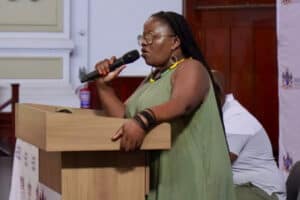It is important that we appreciate, recognise, and reward our educators.

We know that broken and unequal education perpetuates poverty and inequality, but what can be done? While it is easy to play the blame-game, teachers are our coal-face and need to be supported.
We know that many qualified teachers are teaching out-of-field, either in subjects or in a grade level they were not trained to teach.
Some are teaching in disciplines where maybe they themselves did not even take the subject for their own matric. However, that is the reality, and no amount of wishing that fact away will work.
It is imperative that we understand those real needs for content knowledge and mastery and we are also sympathetic to the schools which have over-crowded classrooms, and teachers who have to deal daily with their students’ lived experiences of poverty and inequality.
ALSO READ: The writing’s on the blackboard: Half of SA teachers fail to meet Grade 4 literacy level
At Steam Foundation, we consider the teacher as our principal focus, especially when they are teaching out-offield, which is particularly the case with the Stem (science, technology, engineering, and mathematics) subjects.
What SA needs
They need curriculum-aligned content as well as relevant, and up-to-date teaching knowledge to enable them to be confident and competent.
There is a strong focus on the content critical to the mastery of a concept, along with the “Wow” factor.
Appropriate continuing professional development learning activities can be designed to improve the core competency of teachers, including those teaching out-of-field.
Currently, in South Africa, there is a necessary and needed focus on early, formative years, and on literacy and numeracy, but this cannot leave scientific thinking behind.
Scientific thinking requires both literacy and numeracy, together with curiosity, adaptability, persistence, and resilience.
Critical thinking capabilities are enabled through scientific methodological approaches, and regardless of student aspirations, understanding how things work is a critical life skill.
ALSO READ: Education system crisis: 30 000 qualified teachers are unemployed or doing other jobs
A solution
But what is required for us in SA for impact and scale?
Finland produces top students without a formal curriculum during their formative years, but with a strong focus on teacher competencies and a play-based learning approach, meeting children where their interests are.
Likewise, Singapore likewise has had a laser-like focus on teacher competency which year after year produces sterling results. It is fundamental that we appreciate, recognise, and reward our teachers.
One of the ways we can do this is through making high-quality educational content freely available to retain, reuse, revise, remix, and redistribute as Open Education Resources (OER).
In SA, where copyright is fantastic educational resources are only available through payment, or if a school is fortunate enough to be a beneficiary of a donation or programme.
Despite a few noteworthy efforts in relation to OER – from Siyavula to African Storybook, many materials are not freely available, whether in a digital or printed format – even those produced by non-profit entities.
Research undertaken by Steam indicates that any projects in this sector will find challenges in sourcing enough appropriately licensed OER to build a substantial materials bank that will be useful to national or regional institutions.
- Kure is founder and CEO of the Steam Foundation.
NOW READ: Bela Bill is not the end of the road for homeschooling
Support Local Journalism
Add The Citizen as a Preferred Source on Google and follow us on Google News to see more of our trusted reporting in Google News and Top Stories.








